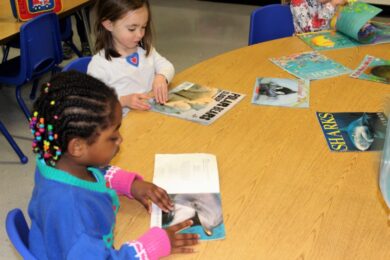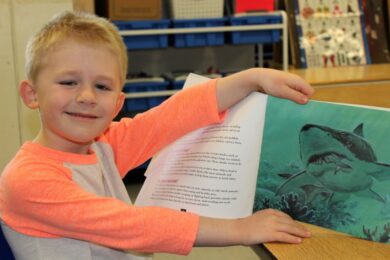Inquiry! Inquiry! Inquiry! Our unit about ocean life comes alive each year because of our commitment to inquiry learning. Some years we study mostly whales, some years we look more at fish and plants. It depends on what the children want to know. This year we seem to have done it all! Because of questions asked by 4 and 5 year old children everyone in the class has learned that Bowhead whales crash up through the ice in the Arctic Ocean in order to breathe. We have learned that whales with baleen have two blow holes and whales with teeth have one.  We have learned that Dolphins are part of the toothed whale group and that Orcas are large Dolphins. Sperm whales can hold their breath for up to 90 minutes while most other whales can only hold their breath for 20 minutes. Sperm Whales dive deep to hunt for giant squid to eat. Sea Turtles have two tiny nostrils and come up to the surface to breathe. Fish have gills that let them gather oxygen from water and so they stay under the water to breathe. Fish and reptiles and mollusks lay their eggs and swim away, but whales and penguins and seals take care of their babies. Mammals and birds take care of their babies. People are mammals and whales are mammals. Emperor Penguin daddies balance the egg on their feet to keep it warm and then tuck the hatched chick up into a belly flap to keep it warm. Penguins spit up food to feed their babies! Some whales have pinkish orange poop! We know all these things because a child asked a question and we did the research with them to find out the answer. In our classroom, you will often hear the words: “What a good question! Let’s do some research!”
We have learned that Dolphins are part of the toothed whale group and that Orcas are large Dolphins. Sperm whales can hold their breath for up to 90 minutes while most other whales can only hold their breath for 20 minutes. Sperm Whales dive deep to hunt for giant squid to eat. Sea Turtles have two tiny nostrils and come up to the surface to breathe. Fish have gills that let them gather oxygen from water and so they stay under the water to breathe. Fish and reptiles and mollusks lay their eggs and swim away, but whales and penguins and seals take care of their babies. Mammals and birds take care of their babies. People are mammals and whales are mammals. Emperor Penguin daddies balance the egg on their feet to keep it warm and then tuck the hatched chick up into a belly flap to keep it warm. Penguins spit up food to feed their babies! Some whales have pinkish orange poop! We know all these things because a child asked a question and we did the research with them to find out the answer. In our classroom, you will often hear the words: “What a good question! Let’s do some research!” 
Every question is a good question. A teacher directs the child to find the correct encyclopedia and then sits with that child and others who are interested. The teacher shows the guide words at the top of the page, finds the pertinent article, and then reads the parts that answer the question(s). If the encyclopedia doesn’t have the answer we look in our other research books (every classroom should have non-fiction books about many topics). If there is still some confusion or if there is more to discover we turn to our computer, making sure we use official sites. This process of asking, researching, discussing, and asking more questions helps light the fire of life-long learning. We, as teachers, often tell the children that we just learned something new because of a question they asked. We thank them! We get excited about it! They get excited about it! Then they ask more questions!!!!
Mrs. Patty LaMothe
Pre-Kindergarten Teacher
